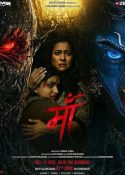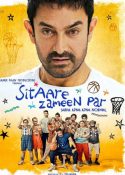First a video
There may be no human rights issue in the modern world that is harder to visualize than the enslavement and sale of children, but that is story told in Sold, which is now having its European premiere at the London Indian Film Festival after opening in Los Angles earlier this year. Based on Patricia McCormick’s book of the same title and compiled based on real-life stories, Sold is a hard-hitting but hope filled saga of a young girl named Lakshmi who is sold into a prison brothel. Through her eyes, we experience her horrors but also the moments of goodness and hope that give her the courage to ultimately escape. It is a powerful tale, and the film and the issues it exposes has changed the lives of everyone involved.
Yesterday we heard from Producer Jane Charles about Sold and now I would like to present my conversation with director Jeffrey D Brown. I beg your indulgence; it is long but worth every moment of your time. It was a conversation that moved me, made me cry, inspired me and more than anything made want to be a voice for this film and for the victims and survivors.
The cast and crew want to use Sold to create circles of change to rescue these girls and end human trafficking and we all should want to help.
The Human Trafficking and Sex Slave Trade Issue
I didn’t think it was this extensive. I mean I knew millions of kids were affected globally, I knew that, and I knew that millions of kids disappeared every year, but I didn’t know the extent of it. I read this report 2 or 3 months ago and I was depressed for 3 days after reading it. I have been doing this for seven years and I thought I was educated in terms of the amount of people; I had no idea it was this extensive.
What is happening globally is because of AIDS: customers are wanting virgins and younger and younger kids. Traffickers perpetuate several myths: One is you will extend your life by having young girls, another is you will get rid of any disease you will have and create your own health and vitality if you have young girls. These are perpetuated global myths and this is everywhere there is trafficking, which means everywhere. America, Africa, India, all over Asia, China. This is the bullshit that the traffickers are telling customers.
They are taken from a rural village or from somewhere in India that is a poorer region. There are all kinds of situations where women and girls become really vulnerable because of poverty and because of the inequity of boys and girls. Parents are very trusting in India and Nepal. Everyone is an auntie or an uncle. A lot of the time the trafficker is a distant relative – he is like a second cousin once removed. The trafficker will say, ‘Oh I will take her and teach her how to be a beautician or she can work for a wealthy family in Calcutta and get paid’. Sometimes the traffickers marry the girls; sometimes they woo them, elope with them. There are all these different methods of getting them. Sometimes they even drug them and bag them. There are a lot of different ways they do it.
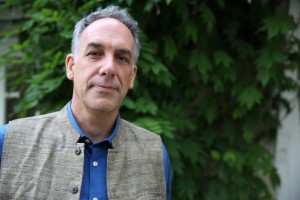 Why Sold
Why Sold
Before I read the book, Joe Kwong and I were going to do a film that was an original story on the sex slave trade. Then Joe’s wife read an article in the New York Times about the novel Sold. Joe read it on Sunday, I read it on Monday and we optioned the book on Tuesday. For a long time I had been wanting to do something that would help get kids in better circumstances because of what my dad did. His career was working in refugee camps globally with kids. He was a pediatric epidemiologist. He would set up food and primary health care, clean water. He’s my hero and I always wanted to do something that would help heal people with film. Two films that inspired me were Salaam Bombay and Born into Brothels. I was looking for something where we could do a model of non-profit and something that was also for profit – like the film was a foundational arm that could really raise a lot of money. We could channel the funds, the resources and the people towards helping kids. That is what we want to do with Sold.
Research
If I was to do a film about soldiers in a certain war and a certain time I would bring all my actors, my cast and my crew and we would just do a deep immersion. Our film took place in a prison brothel, but you can’t really visit a prison brothel as a foreigner or you won’t come out. But I did actually spend a day in a Nepali brothel through an NGO [non-governmental organization]. I went there about 3 or 4 o’clock when all the women were having their first meal of the day, because they sleep during the day. I joined them and I interviewed a lot of them. Then I was put in a room to wait for night. It was kind of scary because my cell phone died. The guy who was my guide left me and said don’t go out of the room because there are criminals who live in this brothel as well and I don’t want them to see you. It was like 2 or 3 hours in that room. I could hear all these sounds and the sounds became really important to me. That was part of the research and it came to be a part of the film, because you heard children laughing, radios playing, there was Aarti going on, people were coming in and selling clothes, jewelry, hair bands to the girls. Cigarette vendors. Later when the brothel opened for business I got to see the Johns. I kept thinking the Johns were going to be these old guys and they were actually these young guys primarily. It was weird. It was like they were on some sort of Bollywood fantasy. All coiffed and oiled hair. Nice shirts. They were like out on a date night with their buddies and they would each pick a girl and go off in different directions. I spotted this from the roof of the brothel looking down on the street. Then I walked through the brothel and what amazed me is just how many men there were. There were thousands of men. You know, these women have 8-15 customers a night – Seven days a week – 365 days a year.
I saw them in India. You walk in the red light districts and you see kids, they are wearing make up and dressed as women, but they are teenagers. They are 16, 13, 18… they are kids. It is happening on a pretty massive scale just in Calcutta where we primarily were.
We visited a lot of the NGOs. As a filmmaker I have been to two wars, but nothing prepared me for going to these NGOs and seeing a kid who was just rescued. Seeing one of these kids all shut down, not making eye contact, they are just like a terrified animal. That was probably the hardest person I have ever seen. What was amazing, though, was all the other girls were being so incredibly tender. Bringing clothes and bringing food over. Really working hard to help this kid begin to trust humans again. That is the extraordinary thing; that they can and do do that.
Jane Charles, the film’s producer, and I also did a lot of interviewing of survivors and mainly people who worked at the NGOS. We weren’t allowed to interview the girls sometimes because it makes them sad. So we would just talk about their dreams for their future. We were sitting with a group of girls and one girl wanted to be an airline stewardess so she could see the entire world. Another wanted to be an animator, like working at Pixar. One of them wanted to be a doctor working with other girls who are survivors. It was really across the board.
Cast Preparation
As far as the actors they did extensive in-depth hanging out with survivors multiple times. We did a deep dive in immersion in Mumbai. We went to the rescue mission with my primary cast. Then we did the same thing in Calcutta, we brought some survivors and also working prostitutes to talk to them for about 4-5 hours. There was a group talk and they got to ask a lot of questions, but they also got to really see how well these women related. How their bodies were held, where they were looking.
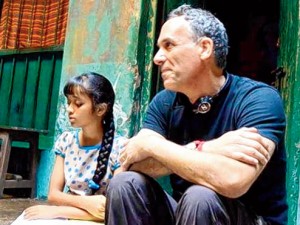 Casting Lakshmi
Casting Lakshmi
The thing that would make Sold not only powerful but also successful is finding not just a kid but also an excellent kid to play the lead, because she is in every scene. The whole film is on her shoulders. We took about 5 to 6 months to cast her. The casting director Tess Joseph is phenomenal. There was a casting team and they went to a lot of schools in Nepal, Calcutta and Mumbai. She probably saw, I would guess, over 1000 kids and she auditioned on video 700 kids with her team. And there were only 2 kids that were anywhere near where what we were looking for and one of them plays the lead. When Niyar auditioned, I was like this is her. We all were. The same thing happened for Sushmita Mukerjee, the brothel owner, because that role was also key. Those two actors really make the film.
Niyar is brilliant. She is a really incredible person. She’s like the most bubbly, happy kid. Really smart and sensitive. Then she can plumb the depths of despair in an instant.
How did you work with her to play some of the horrible scenes?
It was all about building trust and especially trust between her and the other actors. Also using humor. We had an older kid, who was 16, who played her stunt double. So in the scene where there are lots of men, that is not actually her on the bed – that is the older girl in soft focus. So we protected her from a lot of that with an older girl.
Then specifically, like the rape scene, Ankur Vikal who plays Varun, I let him lie on top of me with a pillow in between us and I had Niyar shake the bed, move the bed back and forth as if it was moving because of us and we were all giggling. Then we switched places. It was very technical. We picked actors that were very considerate to her. She was really well taken care of during the entire process.
We spaced out the really intense scenes. We put them back in the schedule so they wouldn’t be the first scenes she would be shooting. Then whenever there was a really intense scene, we would try and really mix it up so there was only one intense scene like every other day or so. Then she wouldn’t be drained emotionally. We used make-up a lot as well, but really it is that she is an EXTRAORDINARY actor. I can’t tell you how many young performers I have worked with, probably thousands in my career, and she is just like WAY beyond. She is like as good as any adult actor and even better than most than I have ever worked with.
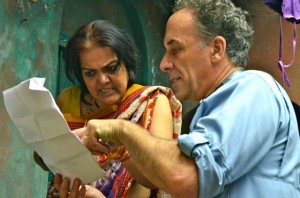 The lead character’s name in Sold is Lakshmi, and when you think of Lakshmi you think of the goddess of wealth and abundance, but if you dig deeper into the origins of Lakshmi you know she is just one aspect of the Mother Goddess. She is also where our wheel of abundance is in our interconnection, in our relationships, in our families and in our friendships. That is our true wealth. Once I sort of discovered that as the root of Lakshmi, I realized that this film is about the sacred feminine. It is about taking care of each other as families, as a global family. We are all interconnected. We are all interrelated. And without that orientation for all of us, women and men, in our hearts we are not going to survive as a species.
The lead character’s name in Sold is Lakshmi, and when you think of Lakshmi you think of the goddess of wealth and abundance, but if you dig deeper into the origins of Lakshmi you know she is just one aspect of the Mother Goddess. She is also where our wheel of abundance is in our interconnection, in our relationships, in our families and in our friendships. That is our true wealth. Once I sort of discovered that as the root of Lakshmi, I realized that this film is about the sacred feminine. It is about taking care of each other as families, as a global family. We are all interconnected. We are all interrelated. And without that orientation for all of us, women and men, in our hearts we are not going to survive as a species.
That is the core of the film, we are all in these prison brothels… we are all getting screwed by life… and the only way to freedom is to care about and do for each other.
One of the very first dialogs between Lakshmi and her Mother is her mom saying, ‘The root of all joy is doing for others and the root of all sorrow is doing for yourself alone.” That is the core message of the film. You see that in action in the brothel. In this terrible situation, the women take care of each other when they can, and support each other. Lakshmi, in particular, really roots for everyone and then she secretly starts to plan to escape.
Gillian Anderson and David Arquette
What was extraordinary about David is that he literally finished shooting a film that was a pretty arduous 3 month shoot I think, in which he played a very large part. As soon as the film wrapped he literally flew to India. He got off the plane, we drove him to the set and he shot the scene with Lakshmi were he is undercover and he comes into her bedroom. So he literally shot the most important scene jet-lagged and exhausted from doing this other film. You know that is a friend!
He has always been a very caring person. He and his family have always been very engaged in doing good work. He didn’t know much about this though until he did this film. I called him early on and he said he would do it. That was great and it also helped us get our funders on board. David is now quite engaged with this issue. There is an organization in LA called CAST (Coalition Against Slavery and Trafficking) and he has gotten quite involved in that.
Gillian’s character of Sophie is based on the photographer Lisa Kristine. She is someone I had heard about and she is someone I became friends with. We rewrote the script when I learned what Lisa was doing. She had gone all over the world, over 40 countries, photographing labor and sex slaves. She has risked her life numerous times to create documentary images of labor and sex trafficking.
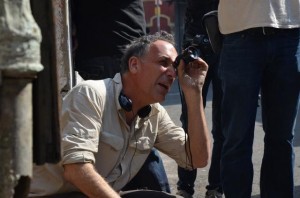 Gillian is someone I had met through the business. She had optioned a book that I wanted to do, so we met through that. That film had not gotten made yet, but I called her up for this. She is also someone who wants to do good things in the world and so she jumped on it right away.
Gillian is someone I had met through the business. She had optioned a book that I wanted to do, so we met through that. That film had not gotten made yet, but I called her up for this. She is also someone who wants to do good things in the world and so she jumped on it right away.
What are you proudest about Sold?
[Mr. Brown paused here, and responded with great emotion.] I will be proud if we raise millions of dollars for these kids. That is all I am trying to do at this point.
Their Hopes for the Film
What we are doing is we have connected to a lot of the trafficking grass roots organizations in India and Nepal. We have also connected to a lot of the major ones that work internationally and we are connecting to national ones in the US. A lot of our efforts are basically connecting things that are already in existence and doing really well with the survivors and those NGOs working with the survivors. Whether it is healing modalities, educational modalities, empowerment modalities or vocational possibilities. These are the things we most want to connect with.
We literally want to raise a lot of money to implement a lot of these goals. What we would love to do is have our film used as a tool to create change in Hollywood, in Bollywood, in Silicon Valley, in Bangalore… everywhere. We would love to have cricket captains and actor and actresses from Hollywood and Bollywood and more stand with us and have gala events. And raise millions of dollars and rupees to channel to these NGOs that are doing extraordinary work and are in the trenches.
These kids need a lot of attention once they are rescued and it is a specialized attention and for a fairly long period of time. They can get through it and they can be fine. They can heal.
We also want to raise that money from college kids nationally and to maybe raise money from high school kids. That remains a goal of ours. The book is a youth novel written for high school kids. So we made the film with the intention of bringing young people into this issue because it is affecting their peers. I have shown it in three high schools. One of the things I am most proud of is how it is being received by 16 to 18 year olds because it changes lives. It opens their eyes to the bigger picture of what they could do in the world and what can be done.
We are really hoping to use the film to leverage change. To create circles of people who are going to be dedicating some of their time or resources or talents to help change this issue and mitigating the end of this human issue globally.
To find out more: http://www.soldthemovie.com



